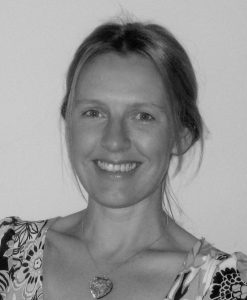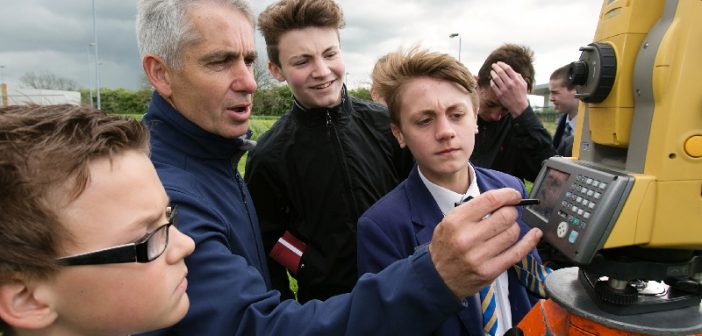Ireland is currently experiencing a skills shortage, and one of the Construction Industry Federation’s initiatives is to encourage young people to join the industry. Alison Watson is Managing Director at Class Of Your Own Limited and an expert in introducing school students to careers in construction. Irish building magazine spoke to Alison about her work and the results achieved.
Speaking to Alison, we asked her to tell us about her professional background and how she got into land surveying from a banking career. “I’m a Land Surveyor, but my professional background actually started in banking. As the kid that was good at maths, but never advised how to use it in the real world, I took a job working with figures. It was the most boring job in the world, but thank goodness, a chance meeting with a civil engineer changed everything. I gave up the high street job at 24 years old, and switched my suit and heels for t-shirt and boots. The freedom, in every sense, was fantastic. I loved working outdoors, and working with technology that was really cutting edge, even 20 years ago. I met some brilliant people, and worked on some great projects, but working as a Project Surveyor on the Building Schools for the Future programme was a revelation. I discovered that I wasn’t the only one who hadn’t been told about the built environment.
Day after day working on school building measurement gave me an introduction to hundreds of school kids who didn’t have a clue about surveyors, engineers, architects, project managers. I soon worked out that, despite believing surveying was the best job in the world, my real flair was for getting kids involved in the work I was doing, and showing them the breadth of opportunities they were missing out on. I started writing educational resources back in 2008, and have never really stopped!”

The impetus from the start was to get kids involved and get construction taken seriously. To do this, it had to be part of the curriculum so Alison wrote a programme. “I wrote a workshop that put kids in professional roles and had them work in design teams to deliver an Eco Classroom building. It was a one-day event, but I really felt that the only way construction would be taken seriously was if Design, Engineering and Construction processes were taught in the classroom as part of the curriculum. Hence, the only thing to do was to write a programme, and since there was nothing out there of that nature, I put pen to paper. The Design Engineer Construct! learning programme evolved, and was in schools from 2012.”
Alison told us about the DEC! programme. “Design, Engineer, Construct!® (DEC!) is a project based learning programme and suite of qualifications that offers students (and their teachers) the opportunity to develop a range of skills and knowledge fundamental to the professional aspects of the construction and built environment sector of industry, and critically, 21st century digital processes. DEC! enables coverage of a wide range of general knowledge, understanding and competences, and with three progressive levels offered from Key Stage 3 (11-14 years), to Key Stage 4 (14-16 years) and Key Stage 5 (16-18 years), will benefit any young person aspiring to progress to technical and professional careers.”
Alison has been working in this area for 9 years. We asked what were the challenges in the early days, and how have they changed. “The current education policy around the English Baccalaureate and league tables leaves little room for innovation in education. I sometimes think there would have been more chance to influence policy if I’d have written the programme in Latin! I do believe this is changing – there’s a lot of noise around technical education and apprenticeships, but I still think the understanding of professionalism and professional careers in construction could be massively improved, not just in schools, but also in government. The DEC! programme is being taken up in a good number of schools now as they realise construction and engineering careers are not ‘low level’ and should be given the respect they deserve, but this also takes leadership (and shouting from the rooftops) from the Department of Education.”
“Perhaps my biggest bugbear is the fact that, despite national Digital Strategies and the rise of computer science, most schools still have terrible IT hardware provision. I don’t know who advises schools when it comes to procurement, but the ‘one size fits all approach’ has to change if we’re to keep up with the rest of the world. Good computers capable of digital modelling and analysis are few and far between, so the programme can be a nonstarter in some schools. I just wish the Government would focus on putting their money where their mouth is when they say ‘Britain will be the best place to study Science, Maths and Engineering’ thanks to the new industrial strategy. We can’t expect kids to come out of school with work ready skills, when the tech available to them is like something from the 1980s.”
Alison described what the results and successes have been from her organisation’s work. “Aside from the dozens of kids getting jobs and placements in industry, the Adopt A School scheme makes me very proud. It’s a unique opportunity for schools and industry to develop a long standing relationship, and work together to support specialist teacher training and student opportunities. After a couple of years, organisations start to reap the reward of a genuine talent pipe with excellent work ready skills.”
Alison, and the teachers and professionals she works with, have inspired many young people to join construction, and we asked her if she could give us some examples. “Absolutely, lots of them, except I can’t take the credit. It’s the teachers and the visiting professionals who make all the difference to the DEC students. Take Bradley Lees of St Ambrose RC High School in Salford. He completed DEC! Level 2 in July 2015, then took up an apprenticeship with Mott MacDonald and after completion of his training, and will go on to university to study Civil Engineering whilst retaining his position with the Group. A Level student Laura Janicka came to St Ambrose Barlow in September 2014 from Poland. Having progressed through DEC! Level 1 and 2, she is now undertaking the Level 3 programme in sixth form. Laura aspires to be an architect, and will apply to go to University later this year.”
BIM, AR and VR are having an impact on design and construction; we asked if these technologies will attract more young people into the industry. “It already is doing. Introducing anything digital to young people, in the age of smartphones and online collaboration, is destined to be successful. I believe that all young people are highly capable of operating in the digital world as they progress through school towards employment, so giving them the tools to do it now can only reap rewards in the future. I’m working with the Soluis Glasgow team to develop a new VR/AR experience for DEC students, and also Topcon, who are enabling student and teacher exposure to high-tech surveying instruments through a dedicated training programme. Scan to BIM, BIM to Field, VR, AR – to kids, these are 21st century tools, and they should be provided with access to them to enhance the learning in the classroom.”
The DEC programme has been trialled in Scotland to success. Alison said, “We trialled the programme in Scotland, and now it’s running rampant. There’s something about the Scottish Curriculum for Excellence that is a better fit for DEC. I suspect by next year, more schools in Scotland will be running DEC than in England.”
With the Irish skills shortage and the fall in interest in building related courses among school leavers during the recession and the slow rise again, we asked if she would you consider running a programme with the Irish Government. “Absolutely! Given that Ireland has been promoting technical education and BIM in the construction industry for a long time, I think it would be a terrific venture. When do we start?! I know a certain gentleman at DIT would be thrilled…” We suspect she is referring to Dr Alan Hore.
Alison has a message for people interested in attracting school students into the Irish Construction Industry. “Help get this going! You all have children – go and talk to their school teachers and head teachers and offer to help support the DEC! programme. Each school that signs up needs an industry partner. I’d love to bring DEC! to Ireland, but the opportunity must also be supported by government to enable teachers to take time out to train and to give young people access to good quality IT. Most of all, don’t continue doing the same old Corporate Social Responsibility as you used to. Get yourselves in the classroom and help kids see where your role in industry can take them.”




